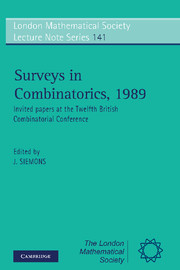Book contents
- Frontmatter
- PREFACE
- Contents
- On the theory of designs
- Designs: mappings between structured sets
- Developments based on Rado's dissertation ‘Studien zur Kombinatorik’
- Designs and automorphism groups
- On matchings and Hamiltonian cycles in random graphs
- Decompositions of complete bipartite graphs
- On the method of bounded differences
- On the use of regular arrays in the construction of t-designs
- The ‘Snake Oil’ method for proving combinatorial identities
On the theory of designs
Published online by Cambridge University Press: 05 August 2013
- Frontmatter
- PREFACE
- Contents
- On the theory of designs
- Designs: mappings between structured sets
- Developments based on Rado's dissertation ‘Studien zur Kombinatorik’
- Designs and automorphism groups
- On matchings and Hamiltonian cycles in random graphs
- Decompositions of complete bipartite graphs
- On the method of bounded differences
- On the use of regular arrays in the construction of t-designs
- The ‘Snake Oil’ method for proving combinatorial identities
Summary
INTRODUCTION
Several years ago I was asked a seemingly innocuous question: What are the minimal-weight vectors of the code of an affine plane? I thought the answer would be that they were, just as in the projective case, simply the scalar multiples of the lines; indeed, that may be true and the question is still open. I managed to prove this (for arbitrary affine planes) only for those of prime order.
The question is deeper than it at first seems. If, for example, one could prove that the minimal-weight vectors of the code of an arbitrary affine plane were simply the scalar multiples of the lines, one would have a proof of the fact [15] that a projective plane of order ten has no ovals; indeed, one would prove that no projective plane of order congruent to two modulo four, except the Fano plane, could have an oval. (The minimal-weight vectors of the code of a desarguesian affine plane are the scalar multiples of the lines of the plane but the only known proof relies heavily on algebraic coding theory.)
These considerations led J. D. Key (who asked the original question) and me to what seems to be a fruitful approach to affine and projective planes and to what we hope will be a fruitful approach to the theory of designs. The purpose of this paper is to explain these matters. Much of the work we have done has already appeared and thus the present paper will rely heavily on four joint papers: Arcs and ovals in hermitian and Ree unitals, Affine and projective planes, Baer subplanes, ovals and unitals, and Translation planes and derivation sets.
- Type
- Chapter
- Information
- Surveys in Combinatorics, 1989Invited Papers at the Twelfth British Combinatorial Conference, pp. 1 - 21Publisher: Cambridge University PressPrint publication year: 1989

